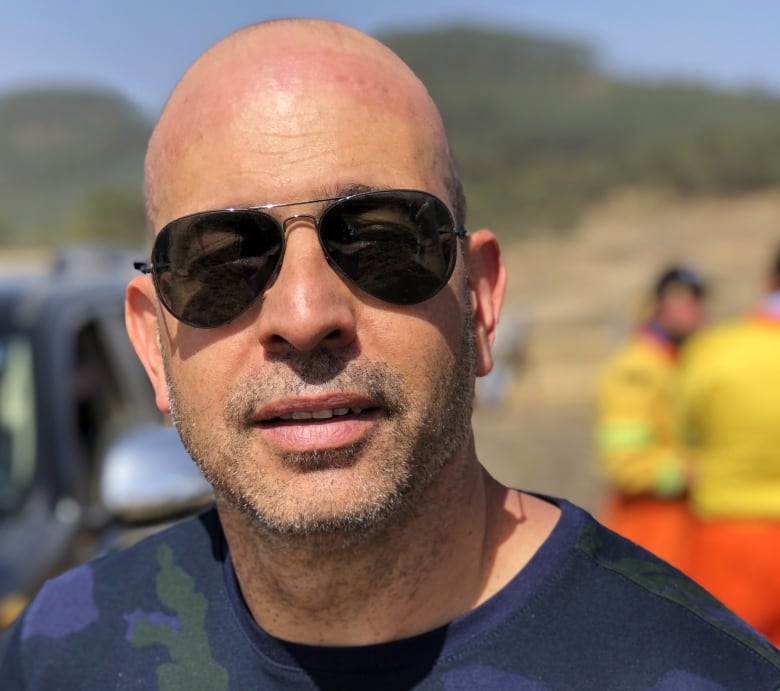Grief and anger as families try to identify loved ones killed in Ethiopia Airlines crash
Family members and investigators comb through dust and debris searching for remains after 157 died
Five groups of Canadians connected to victims of the Ethiopian Airlines crash have now arrived in Addis Ababa, a senior Canadian government official told CBC News on Wednesday.
The official said the process to identify the remains is "at an early stage" and is "extremely complicated," and it could take weeks. Families hoping to return home next week to repatriate their loved ones may be disappointed.
All 157 people on board Ethiopian Airlines Flight 302, which departed Sunday morning from Addis Ababa to Nairobi, Kenya, were killed after the plane ran into serious trouble only six minutes after take off.
The flight roster on the Boeing 737 Max 8 jet was made up of people from more than 30 different countries, including 18 Canadians.
The official said consular staff are providing support on the ground and that Canada is ready to send more help if it is asked.
For Israeli Moshe Biton, Tuesday was his second day at the site looking for the remains of his eldest brother, Daniel Reem. The family wants his remains brought back home for burial.
"It is very important to bring family members to the grave in Israel," said Biton of his search through mounds of debris and dirt at the site which was only cordoned off early Tuesday morning.
"We came here and said some prayers."
Hoping to bury the dead
Like Biton, Ilhan Matzliah also lost a brother here. They're both working with an Israeli volunteer search and rescue group called ZAKA who were sent to help identify the bodies.
"We need to find identities, the DNA, so that we can bury [them]," Bilton said. "Otherwise, the person will stay missing."

His other brother and sister gave DNA in Israel to try to help make the match.
But after two days of searching, Biton still has not found what he came here for.
Biton and Matzliah wrote to the CEO of Ethiopian Airlines asking that the Israeli search and rescue team be given access to the hangar where debris that may contain the human remains are stored.
For now, he has been given his brother's wallet, which was found on the site, while he waits and hopes for more.
That pain was shared by Noordin Mohamed, 27, a Kenyan businessman who lost his brother and mother in the crash.
"Losing a brother and mother in the same day and not having their bodies to bury is very painful," he told Reuters from the Kenyan capital, Nairobi, where the plane had been due to land.
"We are Muslim and have to bury our deceased immediately."
Complicated recovery effort
At the scene of the recovery effort outside of the Ethiopian capital, hundreds of local people from surrounding farming communities watched as teams from a host of agencies and countries pored over the site, which was cordoned off with yellow tape marked "crime scene."
Dozens of rescuers and investigators walked across dry soil in straight lines searching for body parts as large excavators dug into the earth.
The search may be complicated by the sheer number of different parties involved.
On Tuesday, CBC News saw groups at the site from: Boeing headquarters in the U.S., the Ethiopian Red Cross, Ethiopian Police, Ethiopian Airlines, a team from the U.S. Federal Aviation Administration, the U.S. National Transportation Safety Board and a number of other small groups.
None of the official investigators would comment on the recovery efforts when questioned by CBC News.
They mostly huddled and talked among themselves.
Ethiopian Airlines, for its part, said it will take five days to clear the site and return remains to families.
'He had a lot of things left to do'
Lebebew Legesse, the mother of a cabin crew employee who died in the crash, was also searching as she cried at the crash site.
"What I am now demanding is that I get the body of my child," Legesse said. "Whatever happened has happened. I now need to lay her to rest. I came here to see where my daughter lost her life and to make peace."
The friend of another victim of the ill-fated flight cried as he looked at pictures of the deceased on his phone.
Off on a quiet part of the site, a handful of Chinese businessmen stood, wearing all black, as they bowed their heads in a moment of silence and remembrance for a work colleague who died here.
In front of them sat a makeshift vigil to their colleague: fruit, a pack of cigarettes and some of the Ethiopian injera bread he loved.
"It is very sad because he had a lot of things left to do," said Wu Ping of his workmate and friend, as he fought back tears. "But he stopped right here and he will now stay here forever."
With files from Reuters